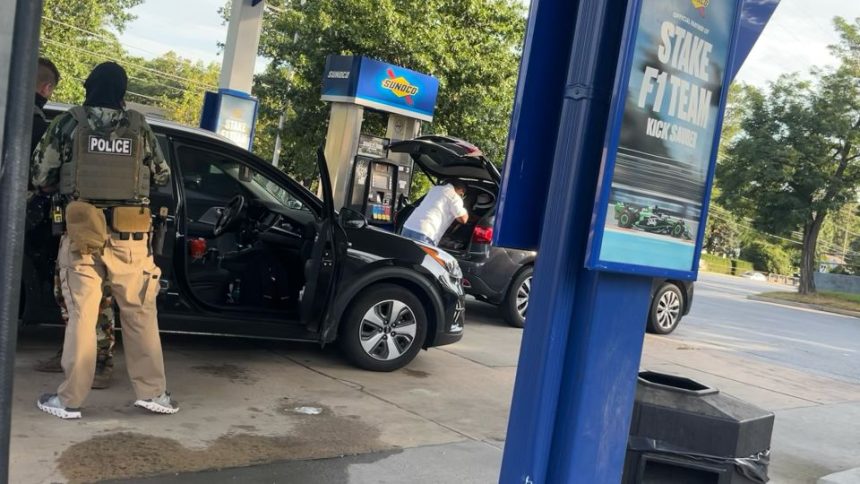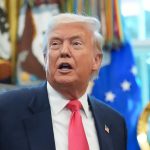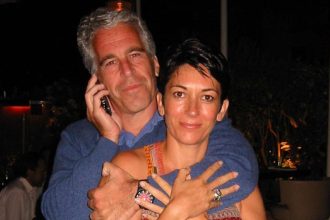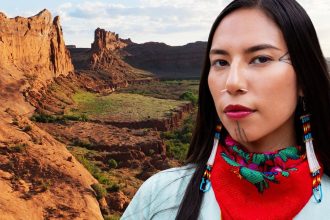I was on autopilot last Thursday when I pulled into a gas station in Takoma Park, Maryland, and annoyed with how the pit stop would add time to my commute to CNN’s office in Washington, DC.
But as I placed the pump in the gas tank, I noticed a man running full tilt toward me. I’d barely registered that he looked panicked – Maybe he was going to miss the bus? – when several things happened at once.
As he skidded to a halt in front of pump 1, a black Kia peeled into the station and pulled up level with him. Instantly, the passenger door opened and a man in khakis, a full-face balaclava and a tactical vest jumped out.
“Why were you running?” he asked repeatedly in Spanish. He continued to fire off questions, but I only heard the man he was chasing clearly give one answer.
“What’s your name?” the masked man asked.
“Samuel,” he replied.
I glanced over the roof of the Kia to see the driver had stepped out and was standing there with a rifle. As we made eye contact, he slid a gaiter over the bridge of his nose. Still, it took my brain a few beats to process what I was seeing:
This was an ICE apprehension.
‘The new world we live in’
My morning commute had just placed me in the middle of President Donald Trump’s immigration and deportation crackdown.
I’d never seen an ICE arrest in person – only on the news and in videos online. And while it’s true I didn’t know anything about Samuel – or witness the interaction that led to him sprinting through the parking lot – nothing about this encounter felt official.
ICE agents apprehend a man at a gas station just outside Washington, DC. – Chelsea Bailey/CNN
For one, the masked men were driving a Kia – a family car I don’t typically associate with law enforcement. And the SUV had generic Maryland flag license tags. Though they appeared to be law enforcement, I didn’t hear them identify themselves. Their tactical gear said “police,” but they didn’t seem to be linked to a particular department or agency, and I couldn’t see any badges.
While I watched the driver stash the rifle in the trunk of the SUV, I considered grabbing my phone to start recording. But almost as soon as the thought occurred to me, I pushed it away.
I’m a Black woman in America. I’ve seen how filming the cops can escalate even the calmest of situations – and this already felt charged.
So, as the first agent cuffed Samuel and demanded to know whether he was “legal or illegal,” I stood between the pumps and decided to make it overtly clear that I was watching.
I rankled when they asked to see Samuel’s papers. There was once a time when masked men could’ve cornered my grandparents and demanded they prove they had a right to be in their own neighborhood. The entire scene felt like history repeating.
The pop of the pump disengaging startled me, and I noticed the driver of the only other car at the station had started recording. Emboldened, I slid into my driver’s seat, cranked the car and pulled around to take my own pictures.
But within seconds, the agents had put Samuel into the back of the Kia and sped away.
I got out of my car and walked over to the other witness. Suffice it to say we were both stunned.
“I think he said his name was Samuel?” I said.
The man, who told me he was an attorney with a public defender’s office, scribbled the name on a legal pad. We both stood there for a beat before he said, “This is the new world we live in.”
I forgot to ask the lawyer his name.
What I saw of the arrest lasted less than five minutes, but it felt terrifying and surreal. I never heard the agents tell Samuel why he was being detained. As the masked men put him in the back of the blacked-out SUV, I felt like I was watching someone being kidnapped.
I dictated notes on my phone as I drove to work and then immediately told my editor and colleagues what I’d seen. We agreed it would be a good idea to get the footage from the lawyer and that’s when reality began to set in.
In my panic and fear, I’d forgotten to ask any of the normal journalistic follow-up questions. I only knew the detainee’s first name, where he was apprehended and that the other bystander said he was a public defender.
With little to go on, I began searching for Samuel.
‘Everybody is scared’
I reached out to ICE to see if they could confirm whether their agents had been active in the area that morning and if they’d detained a man named Samuel.
I also emailed the public defender’s office for Washington, DC, the state of Maryland and nearby Montgomery County. They all agreed to ask around and see if my description of the attorney matched a colleague.
Then, I drove back to the gas station. Until recently, I’d lived less than 5 miles from where Samuel was apprehended. This side of Takoma Park is a suburban, close-knit, predominately immigrant community. It’s also not far from where Kilmar Abrego Garcia was once apprehended at a local Home Depot.
The gas station is the kind of place where the attendants warmly greet their regular customers and there’s a table for locals to sit and chat while they play the lottery.
But the people I spoke to inside weren’t aware that ICE had been in the area or that someone had been arrested at pump 1. I drove to the U-Haul rental center across the street and asked two day laborers nearby if they’d heard about the incident.
“Yes,” they said.
Although neither man felt comfortable sharing his name with a reporter, both told me they’d heard ICE had apprehended three people in the area that morning. One man was buying coffee when agents stopped him, they said. Another was “just looking for work.”
“Everybody is scared – everybody,” one of them told me. The other showed me a grainy photo of the arrests that were circulating online. Neither knew Samuel.
As I drove away, I was struck by the fact that Samuel probably had family and friends in the area who might not hear from him for days or even weeks.
He’d left home that morning and essentially disappeared.

ICE agents detain the man. – Sagar Vyas

A masked ICE agent stands at a gas station in Takoma Park, Maryland. – Chelsea Bailey/CNN
‘An extraordinarily abnormal thing to witness’
On Friday, I returned to the station to see if the manager had any surveillance footage of the incident. That’s where I met Solomon, an Ethiopian immigrant who won the State Department’s diversity visa program lottery 25 years ago and emigrated to America on a green card.
CNN agreed not to share his last name because of his concerns about the current climate toward immigrants. But since arriving in the US, Solomon said he’s earned a master’s degree and now owns a business. That, he added, is the beauty of America.
“If somebody comes (and) by chance they can get into this land, let’s properly treat them like a human being,” he said, adding some people who seek refuge in the US are fleeing war, starvation and poverty.
“They don’t have any hope,” Solomon said, “but this is a great country – it’s big (on) hope. If people are disciplined and stay away from trouble, you can benefit from that.”
Later that afternoon, my phone rang. Although I didn’t recognize the number, I instantly recognized the man’s voice. It was the attorney I’d met at the gas station, Sagar Vyas.
After a proper introduction this time, we began comparing notes on what we’d seen.
“It definitely seemed like – one of those old terms from the post-9/11 time – like a rendition was happening,” Vyas said, referring to the government’s extrajudicial practice of capturing and transferring suspects to foreign locations during the war on terror.
Vyas told me he typically sits in the driver’s seat while he’s filling the tank, and he only noticed the men in neck gaiters and camo when he went to hang up the pump.
As he grabbed the pen and paper from his briefcase, Vyas said he, as a South Asian man, also debated whether to record the incident.
But Vyas said he felt a sense of responsibility.
“Your parents say when you grow up, ‘When you see an injustice, stand up for them,’” he said. “Those sort of soft voices were in the back of my head.”
Still, he said he was deliberate about every move he made. While I was moving my car, Vyas said he’d asked Samuel for his name, but the agents scolded him.
“The two agents said something to each other, and they decided to just throw him in the car and take off,” he said. “It’s an extraordinarily abnormal thing to witness.”
But, Vyas said, later that night he and his wife agreed there is power in simply bearing witness. It’s like the adage, “a watched pot never boils,” he told me.
“We all need to be pot watchers – as a community, as a people, as citizens of this country,” he said.
If someone’s not monitoring the situation, he said, it’s going to boil over.
‘Targeted enforcement operations’
When I got to my desk on Monday, I had an email from an ICE spokesperson.
It read, in part, “Samuel Antonio Garcia Apilcano, 35, is an illegal alien from Honduras.”
According to ICE, he’d entered the country in 2023 and, after he’d failed to appear at a court date, a judge ordered his removal in absentia. ICE did not state if Samuel had any criminal history, or previous interactions with law enforcement. A CNN public records search didn’t return any information on him either.
“ICE is conducting intelligence-based, targeted enforcement operations in and around the district in an effort to make Washington, D.C. and surrounding communities safe and beautiful again,” the statement said.

ICE and other federal agents take a delivery driver into custody on August 16 at Union Station in Washington, DC. – Andrew Leyden/Getty Images
It took a few days, but it was a small comfort to know ICE officials had located Samuel, given the sparse information I gave them. And ICE impersonations have also been on the rise, so I found it reassuring to know the men I saw were, in fact, DHS agents.
But the encounter has made me more curious about ICE enforcement tactics, immigrant rights and what bystanders are legally able to do when they’re caught in the middle.
As the Trump administration continues its immigration crackdown, it’s becoming increasingly likely that more Americans could have the same experience I did in their own neighborhoods.
Candidly, I’m still shocked by what I witnessed. Though I live just outside the district – where it’s not uncommon to see armed federal agents – no one expects to see masked men in an unmarked car chasing and detaining someone on their morning commute.
For more CNN news and newsletters create an account at CNN.com









